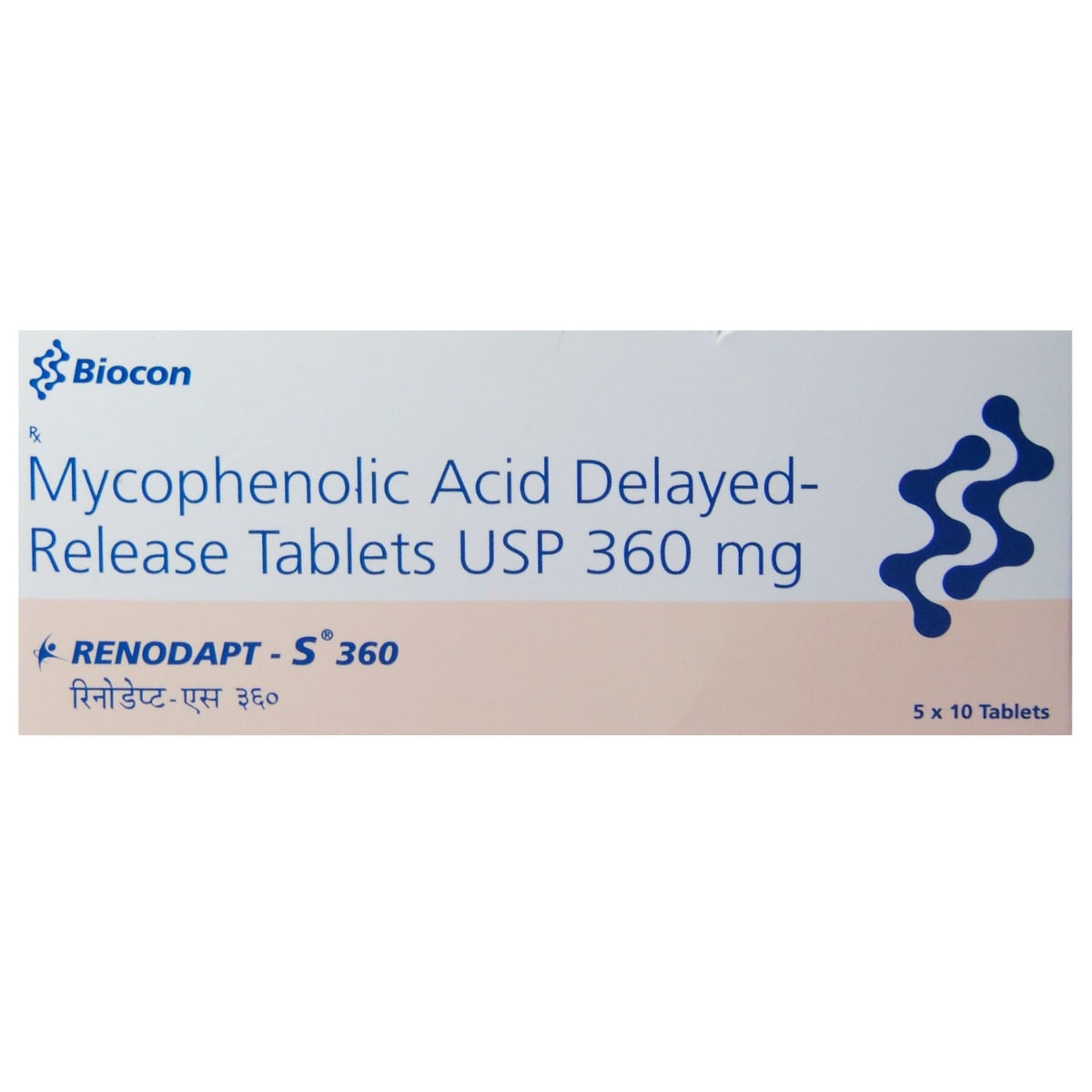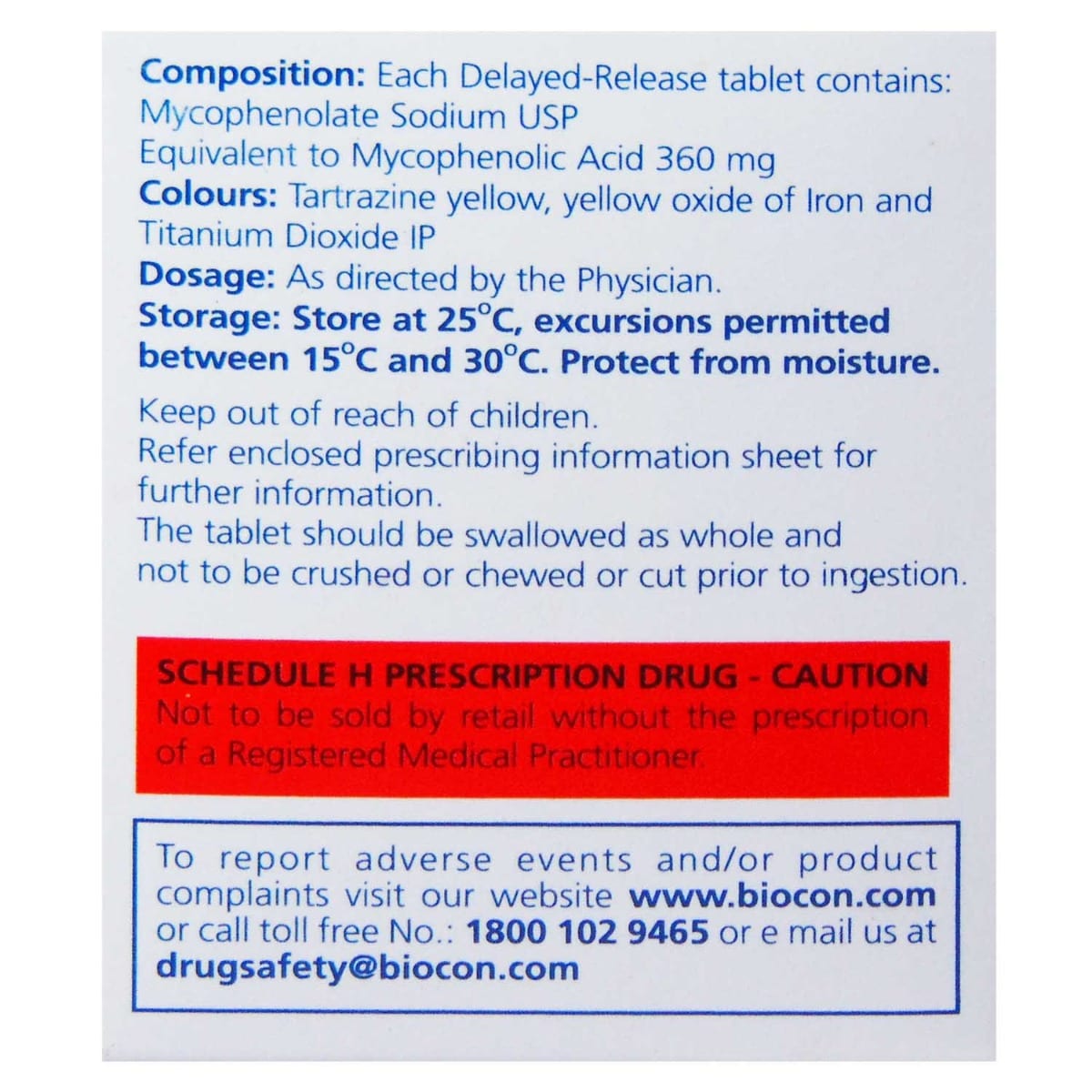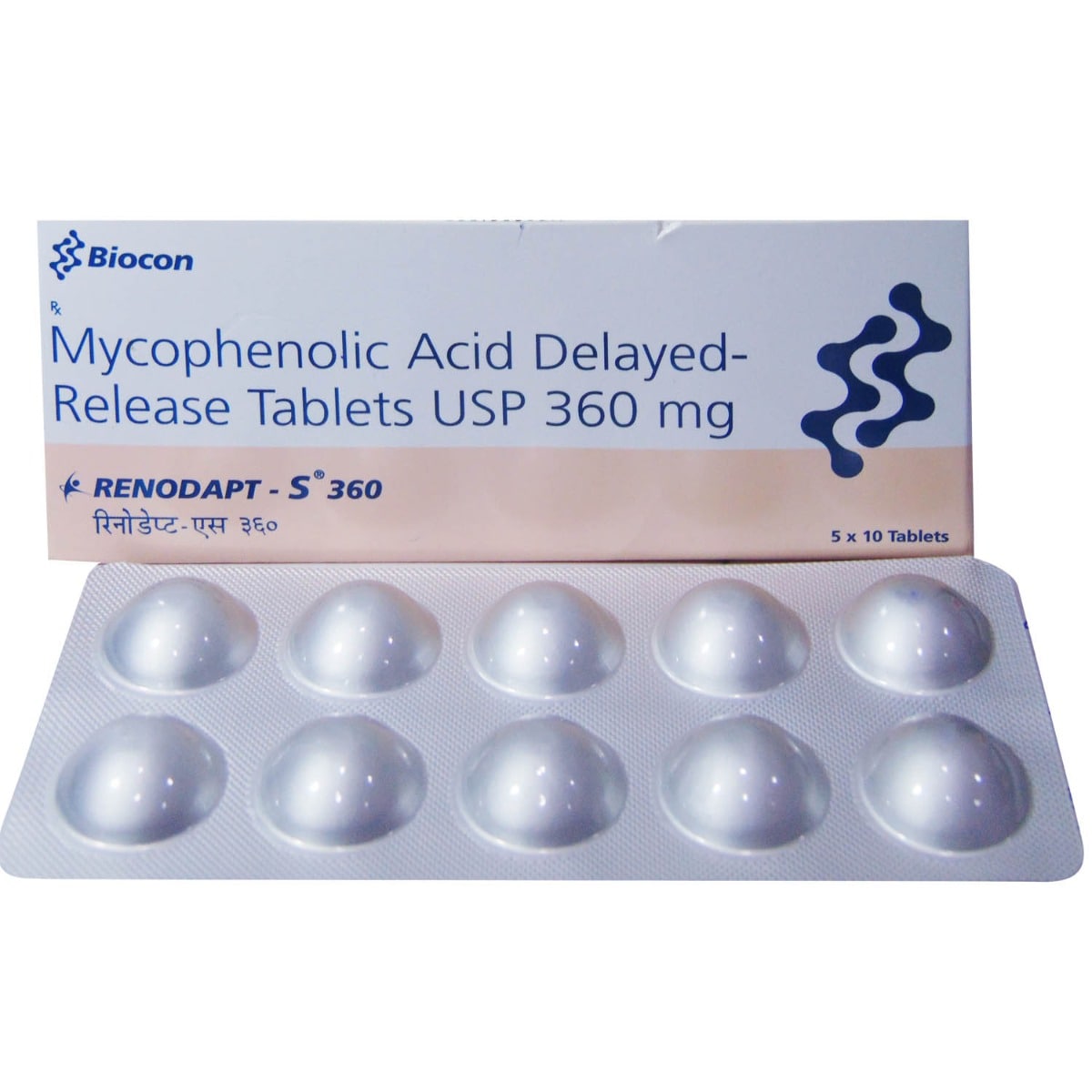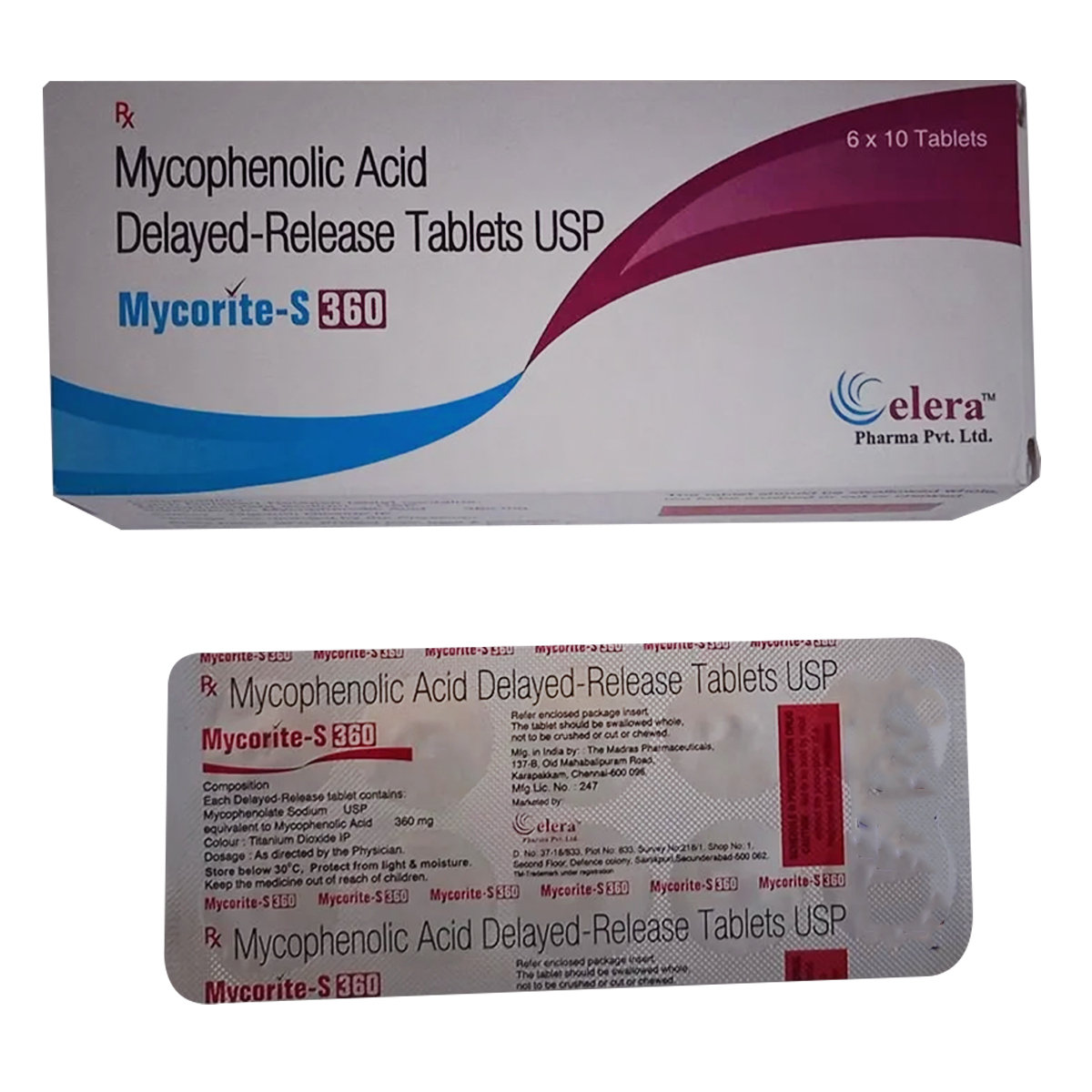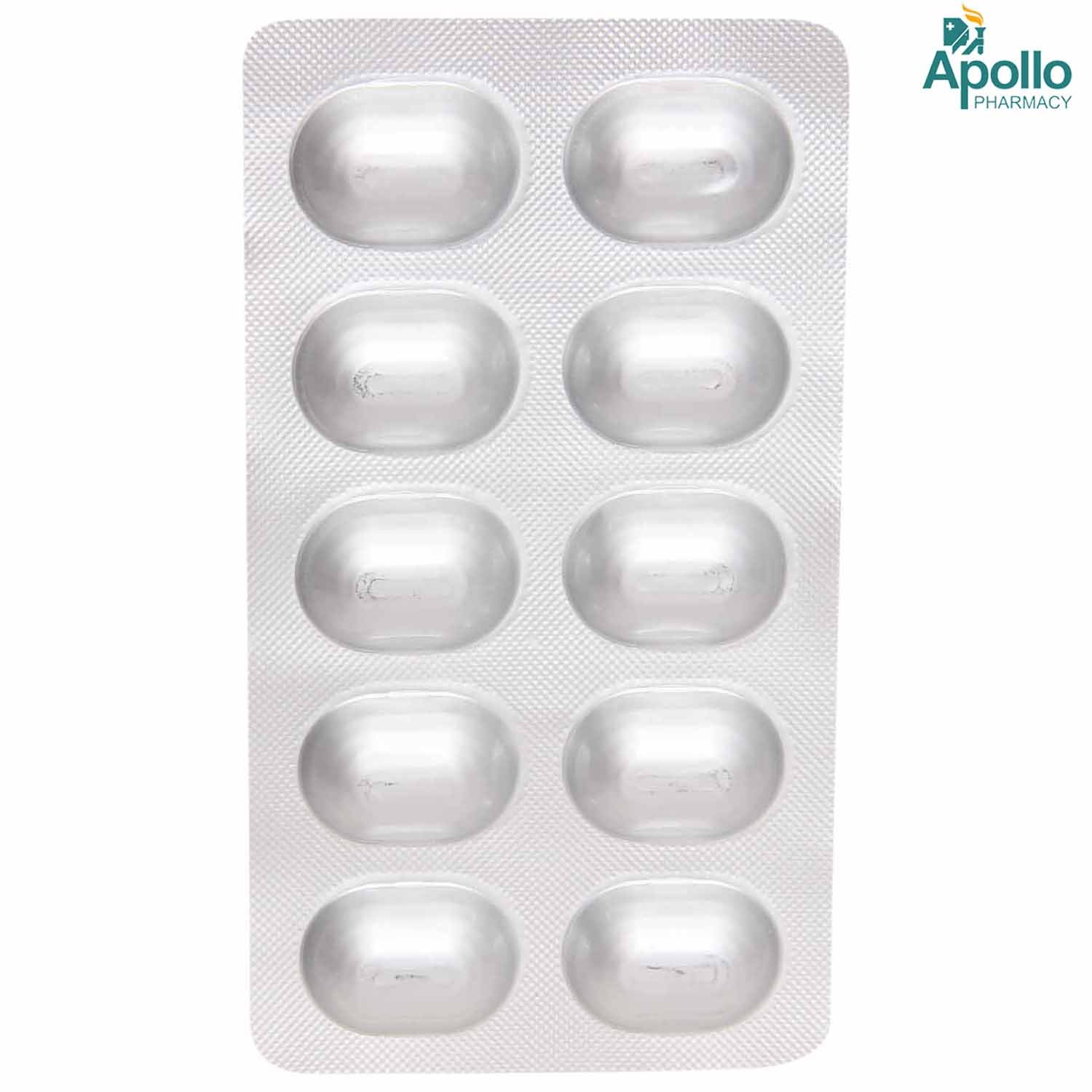Renodapt S 360mg Tablet 10's
MRP ₹1279
(Inclusive of all Taxes)
₹191.8 Cashback (15%)
Provide Delivery Location
Online payment accepted
 Prescription drug
Prescription drugWhats That
Composition :
Manufacturer/Marketer :
Consume Type :
Expires on or after :
Return Policy :
About Renodapt S 360mg Tablet
Renodapt S 360mg Tablet belongs to a class of medications called ‘immunosuppressants’ used to prevent the body from rejecting a transplanted organ such as a kidney, heart or liver. Transplant rejection occurs when the recipient’s immune system identifies the transplanted organ as a ‘foreign object’ and attacks it. If it is not treated promptly, it may cause irreversible damage.
Renodapt S 360mg Tablet contains ‘Mycophenolate mofetil’ used in the treatment of organ transplant rejection along with another immunosuppressant and anti-inflammatory agent. It inhibits T and B lymphocytes (a type of white blood cell that attacks foreign cells) and suppresses the production of antibodies (identify and kill foreign cells). These effects suppress the immune system so that the transplanted graft is not rejected.
Take Renodapt S 360mg Tablet as prescribed. Your doctor will advise you on how often you take Renodapt S 360mg Tablet based on your medical condition. The common side effects of Renodapt S 360mg Tablet are diarrhoea, vomiting, decreased white blood cells and red blood cell count and infections. Consult your doctor right away if any of these side effects persist or worsen.
Do not take Renodapt S 360mg Tablet if you are allergic to ‘mycophenolate mofetil’ or any ingredients present in it. Also, do not take it if you are pregnant, planning to become pregnant, or not using effective contraception and breastfeeding. It can cause birth defects/congenital disabilities in the unborn baby, so make sure you take a pregnancy test before using Renodapt S 360mg Tablet if you are a woman of childbearing potential. You are advised to use effective contraception while taking Renodapt S 360mg Tablet . It can increase the risk of skin cancer, so wear protective clothing and limit exposure to sunlight. It increases the risk of infections as it can suppress the immune system. Do not donate blood or sperm without informing your doctor. Please do not take any vaccinations as it may be less effective.
Uses of Renodapt S 360mg Tablet
Directions for Use
Key Benefits
Renodapt S 360mg Tablet contains ‘Mycophenolate mofetil’ which belongs to the class of ‘immunosuppressants’. It is used to prevent organ transplant rejection. It reduces the activity of the immune system by inhibiting the action of white blood cells (responsible for immune reactions) in the body. It is preferred to use over steroids, which have long-term side effects.
Storage
Drug Warnings
Before taking Renodapt S 360mg Tablet , inform your doctor if you have a sign of infection such as a fever or sore throat, have any unexpected bruising or bleeding, have a history of digestive system problems such as a stomach ulcer, are planning to become pregnant, get pregnant while taking Renodapt S 360mg Tablet , and have rare hereditary disorders such as Lesch-Nyhan or Kelley-Seegmiller syndrome (conditions caused by a deficiency of the enzyme hypoxanthine-guanine phosphoribosyl-transferase (HGPRT)). Limit your exposure to sunlight as Renodapt S 360mg Tablet increases the risk of skin cancer. Do not donate blood while taking Renodapt S 360mg Tablet and for at least 60 days after discontinuing the therapy. Men should not donate sperm while taking Renodapt S 360mg Tablet for at least 90 days after discontinuing the therapy. Please do not take any vaccinations (live vaccine) as it will not be much effective. The oral suspension contains aspartame (sweetener and a phenylalanine source), so it should be used with caution in patients with phenylketonuria (a birth defect/congenital disability that causes decreased metabolism of phenylalanine).
Diet & Lifestyle Advise
- Eat a well-balanced and healthy diet as it helps you to recover quickly. A dietitian will help you to create a diet plan based on your health condition.
- Avoid eating raw or undercooked food.
- Protect yourself from exposure to sunlight and soil. Wear a long-sleeve shirt, hat, long pants and shoes while going outdoors. Also, wear sunscreen with high SPF.
- Stay away from people who are sick.
- Limit alcohol consumption and quit smoking.
- Talk with your doctor at least 2 months before leaving, if you plan to travel, especially to developing countries.
Side Effects of Renodapt S 360mg Tablet
- Diarrhoea
- Vomiting
- Infections
- Low white blood cell (WBC) count
- Red blood cell (RBC) count
Habit Forming
Therapeutic Class
All Substitutes & Brand Comparisons
RX
Out of StockMycotag 360mg Tablet
Innovative Pharmaceuticals Pvt Ltd
₹835
(₹75.15 per unit)
34% CHEAPERRX
Mycorite S 360 Tablet 10's
Celera Healthcare Pvt Ltd
₹890
(₹80.1 per unit)
30% CHEAPERRX
Out of StockMycophate-S 360 Tablet DR
₹1012
(₹91.08 per unit)
20% CHEAPER
FAQs
Drug-Drug Interactions Checker List
- AZATHIOPRINE
- ACICLOVIR
- GANCICLOVIR
- RIFAMPICIN
- NORFLOXACIN+METRONIDAZOLE
Special Advise
- Your doctor may advise you to take regular blood tests to monitor blood cell counts and liver function. In general, the tests are done every 2 to 4 weeks in the initial two months, followed by once every 2 to 3 months.
- Do not have immunizations/vaccinations without the consent of your doctor. Avoid contact with people who have recently received live vaccines (such as flu vaccine inhaled through the nose).
Disease/Condition Glossary
Organ transplant rejection: When you get a new organ transplanted to your body, your body recognizes it as a foreign element and tries to attack and reject it because it is not originally part of your body. So, immunosuppressant drugs are given to such patients to suppress your immune system, stopping it from attacking the newly transplanted organs. Warnings signs of rejection are flu-like symptoms such as chills, headache, nausea, or vomiting, fever higher than 100o F, newly found pain at the region of the transplanted organ, weight gain and fatigue.

Have a query?
Alcohol
Safe if prescribed
Consumption of alcohol may worsen the condition by increasing the risk of side-effects.
Pregnancy
Consult your doctor
Renodapt S 360mg Tablet is a pregnancy category D drug. It causes birth defects in the fetus. So, it is not recommended for use in pregnant women.
Breast Feeding
Consult your doctor
Renodapt S 360mg Tablet is not recommended for breastfeeding mothers as it may be excreted in the breast milk. However, your doctor may prescribe Renodapt S 360mg Tablet if the benefits outweigh the risks.
Driving
Safe if prescribed
Renodapt S 360mg Tablet may not affect your ability to drive. However, ask your doctor's advice, whether it is safe to drive based on your health conditions.
Liver
Consult your doctor
Renodapt S 360mg Tablet should be used with caution in patients with liver diseases. Dose adjustments may be necessary.
Kidney
Consult your doctor
Renodapt S 360mg Tablet should be used with caution in patients with kidney diseases. Dose adjustments may be necessary.
Children
Safe if prescribed
Renodapt S 360mg Tablet should be used with caution in children below 12 years of age. Dose adjustments may be necessary.

